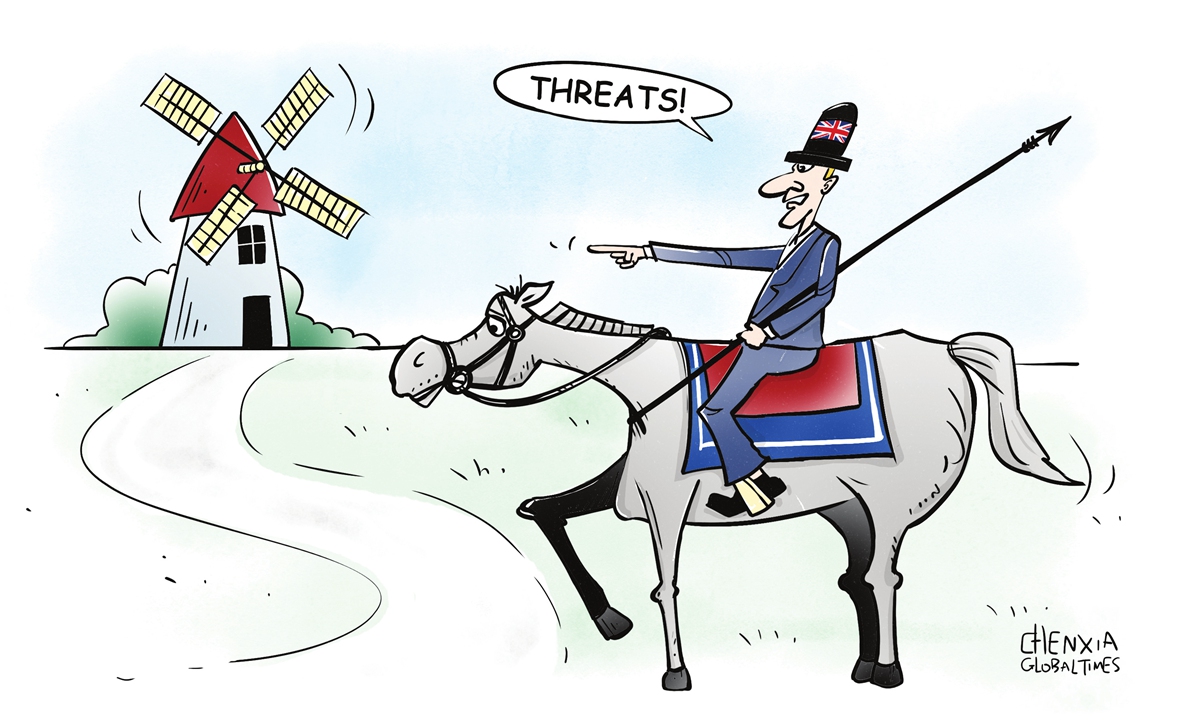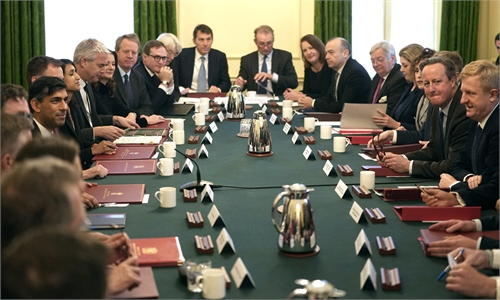
Illustration: Chen Xia/ GT
On Monday, Britain's Defense Secretary Grant Shapps gave an intemperate speech in London about the UK's current defense posture. His first public pronouncement since he took up his post purported to provide an overview of the needs of the country's armed forces, how they can protect the nation's interests and prosecute Britain's foreign policy objectives and how the government will achieve this.
It painted a picture of the UK as a bulwark to foreign military challenges, including China, and it painted China and other nations as existential threats to Britain and its way of life. Some of the language used echoed the belligerent rhetoric of the Cold War - and some of it was plain alarmist.
Most startlingly, Shapps declared that in five years the UK could be at war with China, Russia, Iran and North Korea - all at the same time. He said the world is moving from a post-war environment to a "pre-war" environment. He disparaged those nations as "unstable and irrational" and that they "have the intent to target us." He also said: "Old enemies are reanimated. New foes are taking shape. Battle lines are being redrawn." This is utterly reckless.
However, analysis of the more than 3,000-word speech reveals that it is working at three levels.
Firstly, the war mentality is mobilized to create in the minds of the British public the imagined threat of a phantom foe, or foes. As part of this, Shapps presents the current government in which he serves as being competent and alive to the threat (and therefore best placed to confront it).
Secondly, it adheres slavishly to the policy ambitions of the US, whether it be supporting Ukraine against Russia (at a cost of 7 billion pounds, or $8.9 billion), Israel in Gaza or endorsing the confrontational US activities in and around the "Indo-Pacific" and the Red Sea, to name only a few. Where Washington leads, London follows, like a loyal puppy.
Thirdly, and closely related to the first theme, running through his tapestry of fiction is a persistent thread of personal interest, relating to the forthcoming General Election in the UK. The speech is an unsophisticated, cynical piece of electioneering.
In addition to using the age-old scare tactic of creating an imaginary threat, the speech contains rousing references to both the nation and the government that supposedly serves it. But it also deliberately conflates these with the Conservative Party of which Shapps and his Cabinet colleagues are members, and which is singled out for praise. Opposition parties are deemed "unpatriotic."
He boasts of increased defense spending - 50 billion pounds ($63.5 billion) a year, more than ever before. He points out that the UK is a significant player in NATO which is "bigger than ever" and that the UK is making its largest deployment since the end of the Cold War, with 20,000 personnel committed to the forthcoming Exercise Steadfast Defender. He pompously declares: "The future of the world order is at stake."
In reality, what is at stake is the job to which he is clinging by his fingernails. The Tory government is predicted by a recent poll to lose spectacularly at the next election, which will be almost certainly this year. What this speech amounts to is a shameless piece of party political campaigning.
It is shocking that a senior government minister can talk so irresponsibly. He is prepared to crank up the tensions and temperature with talk of war with China and others not for patriotic purposes but for self-serving party advantage. Warmongering as an election tactic is about as politically cynical as you can get.
It's a piece of unsophisticated, opportunistic tub-thumping, so obvious and unsubtle he should be embarrassed.
Of course, Shapps is right to be worried about job security. In the year leading up to his current job, he had held four other Cabinet posts in just one year (one for only six days). He is the classic Jack-of-all-trades but Master of none. Sounding off like the poorly informed and misguided civilian that he is, Shapps is performing like the very worst of armchair generals, trotting out that old imperialist lie that attack may be the best form of defense.
In these circumstances, it's reasonable to feel sorry for the personnel serving in Britain's armed forces. Impeccably professional, among the best trained and one of the most highly competent militaries in the world, their single most serious vulnerability must be the low-grade quality of their political masters. As warmonger Shapps says, "The world is becoming more dangerous." If it is, it's because people like him are making it so.
The author is a journalist and lecturer living in Britain. opinion@globaltimes.com.cn


